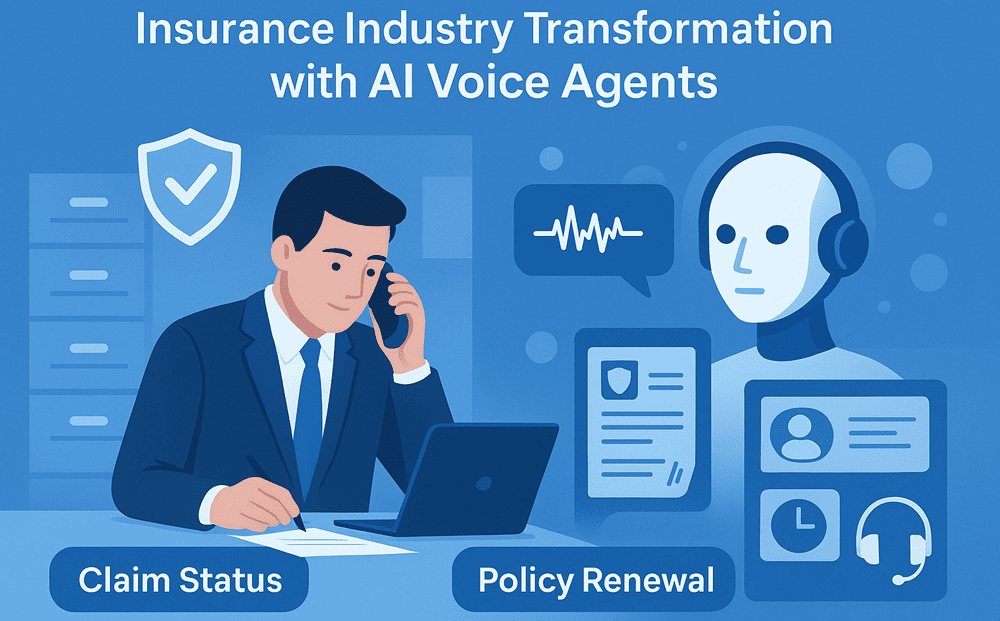The insurance industry is built on trust, accuracy, and timely communication. From policy inquiries to claim updates, customers expect quick answers and personalized service. Yet, insurers face a constant challenge—handling thousands of calls every day without overwhelming support teams or compromising customer experience.
This is where ai for insurance calls is becoming a game-changer. AI-powered voice agents are not just improving response times, they are reshaping how insurers interact with policyholders, prospects, and even internal teams. By combining automation with conversational intelligence, insurers can deliver service that feels more personal, while also cutting costs and boosting efficiency.
Why Insurance Needs AI Voice Agents
The average insurance customer doesn’t want to wait on hold for 20 minutes just to check the status of a claim or ask about renewal dates. They expect the same immediacy they experience with retail and banking services. According to a survey by Accenture, 74% of insurance customers say they value personalized interactions, and more than half prefer digital-first communication.
Challenges insurers face today:
-
High call volumes during renewal and claim seasons
-
Long hold times that frustrate policyholders
-
Repetitive questions that consume agent time
-
Need for compliance and call monitoring accuracy
-
Rising operational costs in call centers
By adopting ai for insurance calls, insurers can automate routine interactions while keeping human staff free for complex, high-value conversations.
What AI Voice Agents Can Do in Insurance
AI voice solutions are no longer experimental—they are ready for real-world use. Below are some ways they are transforming everyday insurance operations.
1. Policy Renewals
Policy renewal AI can remind customers about expiring policies, explain coverage options, and even assist with payment collection. For example, an AI assistant can call a customer saying, “Your auto policy is set to renew next week, would you like me to help with payment today?”
2. Claim Status Updates
The wait for claim processing is often stressful. A claim status call bot can provide real-time updates, explain the next steps, and escalate to a human agent only if required. This not only reduces anxiety for customers but also cuts call center load.
3. Handling Inquiries
From coverage limits to premium amounts, insurance inquiry AI handles repetitive questions seamlessly. Customers get answers instantly, without waiting for an available representative.
4. Lead Qualification
Insurance sales teams spend hours filtering leads, but ai lead qualification tools can handle the first layer of vetting. By asking smart questions, AI can determine if a caller is a serious prospect and route them directly to the right sales agent.
5. Outbound and Automated Calls
With automated insurance calls, AI can conduct follow-ups, send reminders, or schedule callbacks without manual intervention. This ensures customers never miss important updates while sales teams focus on conversions.
Benefits of AI for Insurance Calls
Insurers adopting AI-powered solutions are already seeing significant improvements.
| Benefit | Impact on Insurers |
|---|---|
| 24/7 Availability | Customers can reach out anytime, no wait times |
| Cost Efficiency | Reduce call center staffing needs |
| Higher Customer Satisfaction | Personalized, faster responses |
| Compliance and Accuracy | Consistent information delivery with call recording |
| Sales Growth | AI-driven lead qualification boosts conversion rates |
When combined, these advantages highlight why voice ai agents are becoming essential in modern insurance operations.
Real-World Example: Automating Renewals
Consider an insurer with one million policyholders. During renewal season, even if only 20% call in with questions, that’s 200,000 calls in a short window. Traditionally, this requires temporary staffing, long hours, and higher costs.
With policy renewal AI, calls are handled automatically. Customers can renew policies, get instant payment confirmations, and even receive upsell suggestions for add-on coverage. The result: a smoother renewal cycle with less pressure on staff.
Trust and Compliance in Insurance Calls
Insurance is a regulated industry, so every interaction must be precise and compliant. One concern leaders raise is whether AI can meet these standards. The answer is yes.
AI-powered platforms are designed with compliance features such as:
-
Call logging and transcripts for audits
-
Secure payment integrations
-
Pre-approved scripts for sensitive information
-
Real-time alerts for compliance deviations
This makes AI not just a tool for efficiency, but also a reliable partner for regulatory compliance.
How AI Voice Agents Complement Human Teams
There is often a misconception that AI replaces human agents. In reality, it complements them. Routine and repetitive tasks are automated, while skilled staff handle sensitive, complex, or emotional conversations.
For example, a voice AI agent might explain claim progress to a customer, but escalate to a human if the caller sounds frustrated or requests a negotiation. This balance ensures better customer experience without overburdening staff.
Industry-Specific Use Cases
Here are some targeted use cases for insurers exploring ai for insurance calls:
-
Auto Insurance: Quick claim status updates after accidents
-
Health Insurance: Policy coverage explanations over the phone
-
Life Insurance: Renewal reminders with upsell opportunities
-
Commercial Insurance: AI-driven lead qualification for B2B prospects
Each of these demonstrates how AI is not just about automation—it is about tailoring experiences to customer needs.
AI Voice Agents vs Traditional Insurance Calls
To put the transformation in perspective, here’s a comparison:
| Traditional Insurance Calls | AI-Driven Insurance Calls |
|---|---|
| Long hold times | Immediate response |
| Agents tied up with FAQs | AI handles repetitive tasks |
| Higher call center costs | Lower staffing expenses |
| Inconsistent customer experience | Consistent, 24/7 support |
| Manual lead filtering | Automated ai lead qualification |
The differences show why insurers adopting AI are setting themselves apart in customer service and operational efficiency.
The Future of Insurance Calls
Looking ahead, the role of ai for insurance calls will only expand. We can expect:
-
Predictive AI that anticipates customer needs before they ask
-
Integration with CRM to personalize every conversation
-
Proactive fraud detection through call analysis
-
Emotional intelligence features that adjust tone based on customer mood
For insurers, this isn’t just about keeping up with technology—it’s about staying competitive in a market where customer expectations keep rising.
Key Takeaways for Insurance Leaders
If you’re considering AI solutions for your call operations, here’s a quick checklist:
-
Start with high-volume, repetitive use cases like renewals and claim status updates
-
Train AI voice systems with real policy data for accuracy
-
Integrate with CRM and payment systems for seamless transactions
-
Monitor calls through AI call monitoring tools for quality and compliance
-
Scale gradually, keeping human agents available for complex calls
Final Thoughts
The insurance industry has always been about trust, relationships, and timely support. With ai for insurance calls, companies now have a way to deliver on all three while keeping costs under control. From policy renewal AI to claim status call bots and automated insurance calls, the opportunities are wide-ranging.
Insurers who adopt early will gain a competitive edge, while those who delay risk losing customers to faster, more responsive providers. By integrating tools like AI agents for insurance calls, experimenting with AI fraud detection in insurance, and supporting frontline staff with AI receptionist solutions, insurers can create a hybrid model that balances automation with human care.
The bottom line: the future of insurance communication is conversational, efficient, and AI-powered. Those who embrace it now will define the standard for tomorrow’s customer experience.


